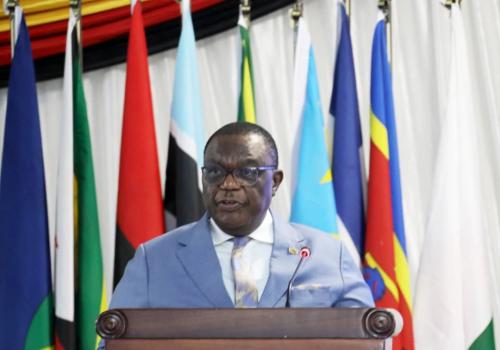SADC Ministers Responsible for Disaster Risk Management met to review progress on the implementation of programmes to strengthen the region’s preparedness to disaster risks.
Disaster preparedness relies on robust early warning systems, proper coordination and the capacitation of structures for effective disaster risk management. Equally important are other components of the disaster management spectrum, such as response, recovery, reconstruction and resilience-building. This was emphasised by the Vice President of the Republic of Zimbabwe, Honourable General (Retd) Dr C. D. G. N. Chiwenga at a meeting of the Committee of Ministers Responsible for Disaster Risk Management held in Victoria Falls, Republic of Zimbabwe on 27 November 2024.
Honourable. General (Retd) Dr Chiwenga encouraged Member States to fast-track the implementation of Disaster Risk Management interventions in line with the provisions of the Sendai Framework for Disaster Risk Reduction (SFDRR 2015-2030), which aims to avert the generation of new risks, reduce current risks and reinforce resilience building. “Consistent with the same framework, Member States ought to ensure timely reporting on the impacts of disasters in order to facilitate early action and response”, he said.
Honourable Daniel Garwe, Minister of Local Government and Public Works of the Republic of Zimbabwe and Chairperson of the Senior Officials Responsible for Disaster Risk Management highlighted that the SADC Region has been faced numerous natural and human induced threats. These threats have increased, both in frequency and severity, undoubtedly due climate change He observed that the rising frequency of disasters, pose significant threats to the well-being of our communities and jeopardises the region’s developments.
He urged Member States to harness National and Regional efforts to manage disaster risks, continue to enhance Disaster Risk Reduction capacity and raise awareness of risks and strengthen preparedness.
Ms. Angele Makombo N’tumba, the SADC Deputy Executive Secretary for Regional Integration emphasised that the meeting is occurring at a critical time when many people need humanitarian assistance due to the severe impacts of the El Nino induced drought. She mentioned that the resources required to meet their needs remain substantial.
The Deputy Executive Secretary highlighted the region’s transition from an El Nino which caused a severe drought affecting various economic sectors and severely impacting on food security, to a La Nina. The La Nina is expected to bring normal to above normal rainfall with the potential for torrential rains, floods and landslides.
Ms. Angele Makombo N’tumba urged Member States to develop adequate contingency plans and allocate resources to protect the significant development gains achieved. She stressed the importance of supporting vulnerable populations and communities that lack the capacity to cope and withstand the impacts of the recurrent and persistent disasters.
During the meeting, the SADC Ministers noted the addendum to the SADC Humanitarian Appeal as presented by the SADC Secretariat and commended the International Cooperating Partners for their support in responding to the impacts of the El Nino induced drought. Ministers called upon International Cooperating Partners to continue supporting national efforts in response to the impacts of the El Nino induced drought and directed SADC Secretariat to identify the lessons learnt in the implementation of the SADC Humanitarian Appeal.
The Ministers noted the status of food and nutrition security in the region and urged Member States to continue undertaking measures to mitigate the shortfalls and support the vulnerable households. They directed the SADC Secretariat to support Member States in monitoring and assessing the likely impact of La Nina projections on food and nutrition security for the 2024/2025 season to facilitate preparedness and early action.
The Ministers welcomed the outcomes and recommendations of the Joint Technical Strategic meeting on Forced Displacement, Fragility Mitigation and Climate Resilience in Southern Africa as presented and directed the Secretariat to convene a Ministerial Meeting on Forced Displacement, Fragility Mitigation and Climate Resilience in Southern Africa to consider the outcomes of the technical meeting on the same.
The Ministers acknowledged the outcomes and recommendations of the report on Mainstreaming Anti-Corruption and Governance in Disaster Preparedness and Pandemic Response in SADC Member States. They urged Member States to implement the recommendations of the Annual Anti-Corruption Report 2023 and adopt and implement the guidelines for Mainstreaming Anti-Corruption and Governance in Disaster Preparedness and Pandemic Response in SADC Member States.
The Ministers recognised the disasters that affected the region in the 2023/24 tropical cyclone season, their impacts, as well as the weather and climate projections for 2024/25 seasons, urging Member States to adequately prepare for any eventuality.
They acknowledged the dashboard for the Regional Hazards and Preparedness for 2024/25 season, as outlined in the regional hazards and preparedness plan for 2024/25 season, they directed the Secretariat to continue monitoring the 2024/25 weather and climate situation to timely inform early action, approved the draft Drought Resilience Building Programme and urged Member States and partners to support the roll out of the Drought Resilience Building Programme.

